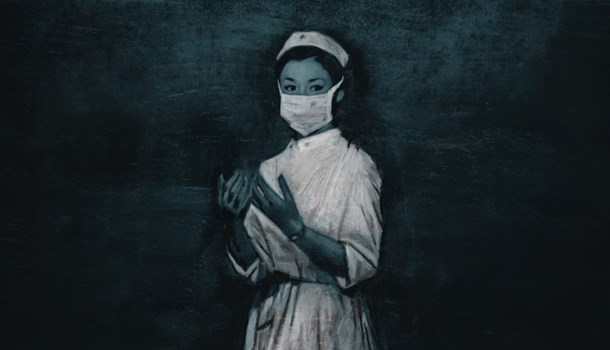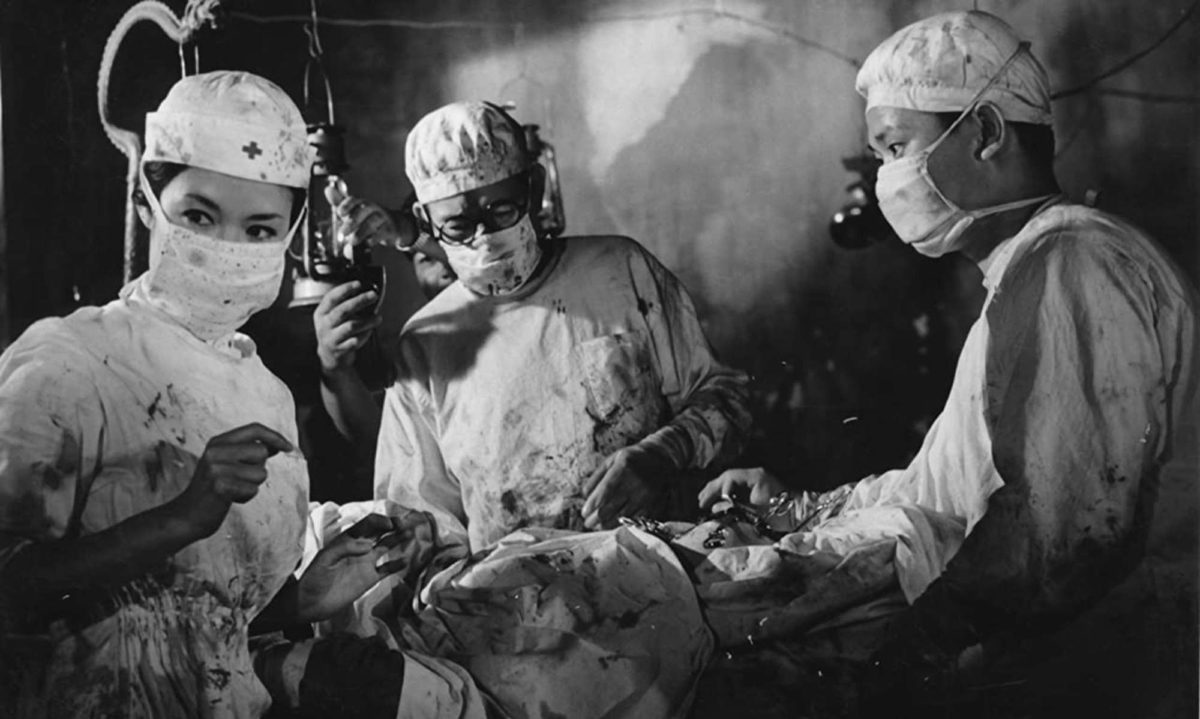
Written by Richard Durrance on 07 Feb 2023
Distributor Arrow Films • Certificate 15 • Price £16.99
Some days you turnaround and there’s another film about the horrors of war. Long gone the days of John Wayne in The Green Berets trying to tell us how righteous war is, but when it comes to sheer visceral anti-war power few films live up to Yasuzo Masumura’s 1966 Red Angel (ironically made two years before the ra-ra nonsense of The Green Berets).
Nishi (Ayako Wakao) is a young nurse sent to China to look after invalid soldiers. Having been raped by one of the men in her care and reporting it she is sent close to the front line, to a field hospital where she meets Dr Okabe (Shinsuke Ashida) who she becomes close to, then both Nishi and Okabe are sent to a small village on the front line.
Shot in stark black and white, few films can be said to be so visually apt. Unlike many films of the time still shot in this way, few are quite so highly contrasted. Few films are also so effective in telling their story. Unfolding over 95-minutes, Red Angel is harrowing but never unbearably awful in its portrayal of war. The decision, one assumes taken from the source novel, to follow a nurse adds strength to the impact of the film because whereas we could follow soldiers as they become dehumanised, instead we see how nurse Nishi embraces her humanity, though sometimes in curious and perverse ways (not unusual, this is a Masumura film after all). It is also never a film to linger on its unpleasantness, it allows the situation to speak for itself, whether this is when Nishi is raped, other patients complicit in her attack and the consequent revelation that she is not alone in being attacked by the same patient. Nor later, when nurse Nishi assists Dr. Okabe as he amputates limb after limb, his patients at best given a local anaesthetic, Masumura presents these events without excess subjectivity, recognising that the groaning hellish field hospital and brief images of barrels full of amputated limbs is more than enough to shock and disturb the audience. And it does, all the more so for never going into full on horror. Masumura focusses on patient and medical staff, ensuring that the human horror is front and centre rather than, say, lingering on a saw cutting through limb and bone. Yet it still powerfully strikes you just how the situation they are all in is close to an actual hell.
This centrality of character, too, means we are given release from the horror, as Nishi starts to become closer to the older doctor, Okabe, who himself is no plaster saint, but his horror is an addiction that allows him to survive the sleepless days and nights where his work as a medical practitioner seems subsumed to saying who lives, who dies, and causing pain even to those that survive. And what chance those that survive in a world that wants to believe that war is a glorious endeavour? Set just before Japan’s entry into World War Two, we see how soldiers without limbs have become lost creatures, lost because the powers that be from home believe like John Wayne in The Green Berets that war is righteous, and so has no place for people like them, who by their very deeply hurt bodies are a message that tells those back home war is not good, war is pain, for everyone: soldiers who are asked to be become unhuman, nurses that witness pain and are abused, doctors whose ideals are vanquished and finally the ‘comfort women’ who soldiers treat as objects.
Yet there is a strand of underlying humanity, often in the relationship between Nishi and Okabe, but also in small connections such as when returned to the coast, away from the front, back with the convalescing soldiers, Nishi befriends a solider who has lost both his arms. Her care for him recognises that, armless, there are things he cannot do for himself sexually and he cannot be sent home to his wife, and so Nishi helps him not just as a friend. The film often reflects on war and sex, whether rape, the three comfort women on the front line, or Nishi’s consensual assistance with the solider and eventual sexual relationship with Okabe, but there is a matter-of-fact approach to it that allows us in the audience to bring our own moral centre to it. Though often it is of course viewed thematically in how war brings the lesser angels out of soldiers who see nothing before them but death or perhaps to be hidden in an institution for life, not returned home as heroes but are instead treated as an embarrassment, yet within this is of course our blood-stained red angel, Nishi.
For all of its nihilistic and sometimes shocking content, and Red Angel is horrifying in what it portrays, it is a film that is potent and curiously watchable, mainly because it is ultimately humane. Red Angel does not posit that humanity is awful but that awful situations will often draw out our devils and only occasionally our angels. The touching relationship between Nishi and Okabe, too, ensures we always see how even during the worst times those that embrace fewer of their devils can find a way to exist in harshly impossible and what might seem to many insane situations. Ayako Wakao excels as Nishi, often because you can see the emotions running through her as opposed to an excessively emotive performance. It’s the kind of acting that sometimes seems hard to gauge because it’s not showy but instead perhaps embodies the character perfectly. Ashida you could argue has the easier role as Okabe, and he's definitely well cast, his worn face seems perfect for the addicted doctor ground down by becoming a glorified bonesetter and bone-saw.
Red Angel may not be an easy watch but it is certainly one of the best films about war and how people in extreme circumstances can hope to lose or retain their humanity. While it may not be one you return to every year, it’s one that (now watching the Arrow blu-ray that replaced my old Yume Pictures DVD) is always rewarding and always disturbing.


Long-time anime dilettante and general lover of cinema. Obsessive re-watcher of 'stuff'. Has issues with dubs. Will go off on tangents about other things that no one else cares about but is sadly passionate about. (Also, parentheses come as standard.) Looks curiously like Jo Shishido, hamster cheeks and all.
posted by Richard Durrance on 03 Feb 2026
posted by Richard Durrance on 27 Jan 2026
posted by Richard Durrance on 19 Jan 2026
posted by Richard Durrance on 08 Jan 2026
posted by Richard Durrance on 17 Dec 2025
posted by Richard Durrance on 12 Dec 2025
posted by Ross Locksley on 09 Dec 2025
posted by Richard Durrance on 28 Nov 2025